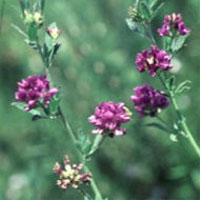
A-Z Indexes Food Health Guides
Health News |
AlfalfaFind ProductsAlso indexed as:Medicago sativa  © Steven Foster © Steven FosterBotanical names: Medicago sativaParts Used & Where GrownAlfalfa, also known as lucerne, is a member of the pea family and is native to western Asia and the eastern Mediterranean region. Alfalfa sprouts have become a popular food. Alfalfa herbal supplements primarily use the dried leaves of the plant. The heat-treated seeds of the plant have also been used.
Our proprietary “Star-Rating” system was developed to help you easily understand the amount of scientific support behind each supplement in relation to a specific health condition. While there is no way to predict whether a vitamin, mineral, or herb will successfully treat or prevent associated health conditions, our unique ratings tell you how well these supplements are understood by the medical community, and whether studies have found them to be effective for other people. For over a decade, our team has combed through thousands of research articles published in reputable journals. To help you make educated decisions, and to better understand controversial or confusing supplements, our medical experts have digested the science into these three easy-to-follow ratings. We hope this provides you with a helpful resource to make informed decisions towards your health and well-being. This supplement has been used in connection with the following health conditions:
Traditional Use (May Not Be Supported by Scientific Studies)Many years ago, traditional Chinese physicians used young alfalfa leaves to treat disorders of the digestive tract.1 Similarly, the Ayurvedic physicians of India prescribed the leaves and flowering tops for poor digestion. Alfalfa was also considered therapeutic for water retention and arthritis. North American Indians recommended alfalfa to treat jaundice and to encourage blood clotting. Although conspicuously absent from many classic textbooks on herbal medicine, alfalfa did find a home in the texts of the Eclectic physicians (19th-century physicians in the United States who used herbal therapies) as a tonic for indigestion, dyspepsia, anemia, loss of appetite, and poor assimilation of nutrients.2 These physicians also recommended the alfalfa plant to stimulate lactation in nursing mothers, and the seeds were made into a poultice for the treatment of boils and insect bites. Copyright © 2026 TraceGains, Inc. All rights reserved. Learn more about TraceGains, the company. The information presented by TraceGains is for informational purposes only. It is based on scientific studies (human, animal, or in vitro), clinical experience, or traditional usage as cited in each article. The results reported may not necessarily occur in all individuals. Self-treatment is not recommended for life-threatening conditions that require medical treatment under a doctor's care. For many of the conditions discussed, treatment with prescription or over the counter medication is also available. Consult your doctor, practitioner, and/or pharmacist for any health problem and before using any supplements or before making any changes in prescribed medications. Information expires December 2026. |
